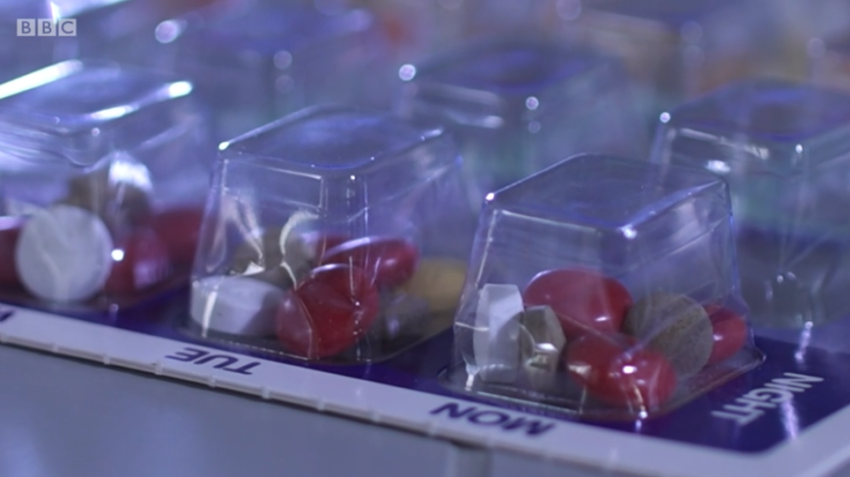Rethinking multi-compartment compliance aids.

The use of a multi compartment compliance aid (MCA) or monitored dosage systems (MDS), as pictured above, is often seen as an easy way to deal with the sometimes complex problems of ensuring patients take their medicines. There is scant evidence of benefit, and they aren’t without harm. In one area of the UK it was reported that 30% of reported medication safety incidents related to MCAs.PDF
The MCA above comes from a BBC report on the tragic death of a patient following an error, leading to the patient taking two MCAs at the same time. I was asked to look at a number of the MCAs that the family had in their possession to look at alleged failures to follow the Standard Operating Procedures in their production. The programme is on BBC iPlayer for a short time, if you wish to view it. See update at bottom for clarification about the case.
The case itself got me thinking about the use of MCAs in the context of the changing context of pharmacy practice, as well as the drive in therapeutics on polypharmacy, and the deprescribing movement. It’s five years since the publication of the Royal Pharmaceutical Society’s report on MCAs PDF.
With the limited evidence base currently indicating a lack of patient benefit outcomes with the use of MCA, it is a recommendation of the RPS that the use of original packs of medicines, supported by appropriate pharmaceutical care, should be the preferred intervention for the supply of medicines in the absence of a specific need for an MCA in all settings.
I’m not sure matters have improved, and a number of questions have arisen in my mind.
Firstly, what are the incentives for moving away from MCAs? It seems as though MCAs are seen as a method of script capture by pharmacy businesses. How can we change the model to reduce their use?
Secondly, making up an MCA is essentially a manufacturing process. It is not dispensing. It has just as complicated a production process, with many potential pitfalls, as extemporaneous dispensing. We no longer do that in community pharmacy. Shouldn’t MCAs be made in designated production areas, away from clinical activity, that can run standard operating procedures as production unit? There may be a cost involved, and a move to hub supply, but see point one.
Thirdly, shouldn’t we be focusing on ensuring that patients can develop the simplest and most appropriate medication regime for their health needs? Sticking an MCA-plaster on top of the accumulated medicines that a patient finally finds too much too cope with is not the answer. If some says “I think we should use an MCA for this patient”, the answer should be “Let’s review the patients’s medication” with them.
UPDATE: On LinkedIn, the MD of a company supplying MCAs suggests that this blog post blames MCAs for the death reported in the BBC programme. It does not. The purpose of this post wasn’t to tar MCAs with that specific incident, but to explore some points the case had made me think about. Whether the circumstances that arose to the double supply of a medication would have arisen if the patient had not been put on MCAs no one can guess. He is correct however to note that this blogpost does not mention the primary error (relating to communication) leading to the patient death or the company involved, that is set out in the TV programme and the BBC webpage dealing with programme if you are interested. At the inquest it was found that the patient “was inadvertently given double his medicine by two separate Boots pharmacies in a “communication breakdown”.